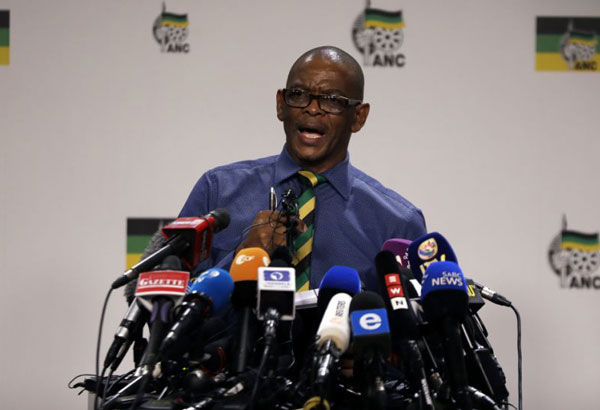South Africa's ruling party demands that Zuma resign

Secretary General of the African National Congress, (ANC) Ace Magashule, makes a statement at a briefing at the ANC headquarters in downtoan Johannesburg, Tuesday, Feb. 13, 2018. Magashule said the scandal-tainted President Jacob Zuma must leave office. (AP Photo/Themba Hadebe)
JOHANNESBURG — South African President Jacob Zuma must leave office promptly so that the country can move toward political stability and economic recovery, the ruling party said yesterday, finally disowning a leader who has been discredited by corruption scandals.
However, the African National Congress said it does not know whether the politically isolated president will heed the decision of the party's national executive committee, which expects a response from Zuma on Wednesday.
If Zuma refuses the order, parliament might vote on a motion of no confidence in the president, deepening the embarrassment of the party that was the main movement against white minority rule and has led South Africa since apartheid ended in 1994.
"I don't know what will happen, but let's leave it to President Jacob Zuma," said Ace Magashule, the ANC's secretary-general. He said there was no deadline for 75-year-old leader to reply, leaving open the possibility that the political crisis could drag on.
Zuma had agreed to resign and wanted to stay in office for several more months, but the national executive committee agreed at a 13-hour meeting that he had to leave at once, Magashule said. He spoke respectfully of Zuma, saying the president had contributed to the struggle against apartheid and had not been "found guilty in any court of law" despite various scandals over the years.
The ANC looks forward to an "amicable solution" and "it's obvious" that the party wants Deputy President Cyril Ramaphosa to succeed Zuma, the secretary-general said. Ramaphosa was elected party leader in December and has vowed to fight corruption.
Zuma, who took office in 2009 and is in his second five-year term, has not made any public appearances in recent days. He met with ruling party leaders who visited him at his Pretoria residence late Monday and again on yesterday morning to ask him to quit. Magashule described the discussions as "cordial."
South Africa, which has one of Africa's biggest economies, has faced extended uncertainty over Zuma's fate. Government leaders hope the standoff can be resolved ahead of the unveiling of the national budget in parliament on Feb. 21, which would go some way toward reassuring investors that the country is getting back on track.
"We are determined to restore the integrity of the public institutions, create political stability and urgent economic recovery," Magashule, once a staunch supporter of Zuma, told reporters.
A motion of no confidence sponsored by an opposition party, the Economic Freedom Fighters, has been scheduled for Feb. 22 in parliament. Opposition parties want the vote to be moved up to this week and then want parliament to be dissolved so that early elections can be held.
Zuma has survived similar motions in the past, but ruling party members now see him as a political liability ahead of 2019 elections and likely would vote against him on the orders of the party leadership.
The ANC once commanded moral stature as the party of Nelson Mandela, but scandals linked to Zuma, who denies wrongdoing, have cut into its popularity.
South Africa's top court ruled in 2016 that Zuma violated the constitution following an investigation of multi-million-dollar upgrades to his private home using state money. A judicial commission is about to start a probe of alleged looting of state enterprises by Zuma's associates, and prosecutors are expected to announce soon whether they will reinstate corruption charges tied to an arms deal two decades ago.
Ramaphosa has held private talks in recent days with the president on a power transition, angering opposition parties who described the process as an affront to South Africa's democracy.
- Latest
- Trending

































